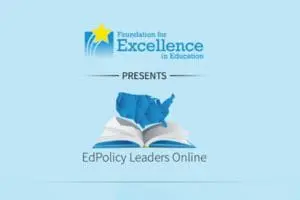By: Aimee Rogstad Guidera, President and CEO, Data Quality Campaign & John Bailey, Vice President of Policy, Foundation for Excellence in Education. This blog is also posted on The EdFly Blog.
When students, parents, educators, and policymakers have the right information to make decisions, students achieve their best.
Data can demonstrate what’s working and what’s not for students. And effective data use can expand a child’s horizons by providing more information about individual students to help guide teachers, parents, and students themselves make better decisions about their learning.
Data also allow policymakers to more effectively target resources to increase efficiency and improve outcomes so students graduate prepared for success.
If you’re not using data, what are you using? Education is too important to be run on hunches. Effective data use takes the guesswork out of education decisions. It guides informed choices at all levels — from policymakers to parents and everyone in between.
But leveraging the power of data to personalize learning and empower more informed decisionmaking is dependent on people finding value in the data and trusting that data will be kept safe and secure. For years, the Foundation for Excellence in Education (ExcelinEd) and the Data Quality Campaign (DQC) have promoted using academic data to inform decisionmaking to improve school and student achievement. Building trust that this data is being used legally, responsibly, and effectively is critical to this goal.
Parents must have confidence that states and school districts will ensure their children’s information remains confidential.
Recognizing the challenge policymakers and lawmakers face around these issues, DQC and ExcelinEd together have developed an online course as part of the EdPolicy Leaders Online initiative entitled: “Student Privacy? Get Schooled.’’
The course will be live on March 23, with enrollment now open.
In the course, we discuss the value of data and offer recommendations for safeguarding data while using data to improve student success. We also explore lessons learned from existing and emerging policies to protect data in education and other sectors.
As it now stands, there is confusion about what student data is collected and who has access to it. This void allows the perpetuation of myths and misperceptions, such as the false claim that student records are sold to private companies for marketing purposes.
The surest way to deal with confusion is transparency. Parents should know what data is being collected on their children and have access to it. Educational institutions, and their contracted service providers with access to student data, including researchers, should have clear, publicly available rules and guidelines for how they collect, use, safeguard, and destroy those data.
These and many other timely issues are covered in our online course. We are pleased to feature experts such as Kathleen Styles, Chief Privacy Officer, U.S. Department of Education; Carey Markel, Data Privacy Officer, Colorado Department of Education; Jules Polonetsky, Executive Director and Co-chair, Future of Privacy Forum; and Jim Siegl, Technology Architect, Fairfax Country Public Schools, Virginia.
The course is self-paced. It is comprised of ##modules, which offer both video and written core content that each take no longer than an hour to digest. Additional resources are available in each module for those that want to take a deeper dive into specific topic areas. A digital badge and a certificate will be provided for course completion.
This course is a unique opportunity to become better informed on one of the most vital yet misunderstood issues in education today.
We look forward to your participation, enroll today.
Aimee Rogstad Guidera, President and CEO, Data Quality Campaign: Aimee Rogstad Guidera is the President and CEO of the Data Quality Campaign (DQC), a national, nonprofit organization leading the effort to empower educators, students, parents, and policymakers with the information they need to make the best decisions to improve student outcomes. Aimee believes that data have the power to transform education to ensure every child in this country is prepared for success in college and careers. Before founding DQC, Aimee served as the director of the Washington, DC, office of the National Center for Educational Achievement. She previously served as vice president of programs for the National Alliance of Business (NAB), worked in the education division of the National Governors Association’s Center for Best Practices, and taught for the Japanese Ministry of Education.
John Bailey, Vice President of Policy, Foundation for Excellence in Education: At ExcelinEd, John oversees policy strategy, working with public policymakers and advocacy organizations to advance education reform and next generation models of learning. Previously, he co-founded Whiteboard Advisors, a strategic consulting practice that provides policy counsel and research for philanthropists, entrepreneurs and investors. He served at the White House as Special Assistant to the President for Domestic Policy during the Bush administration. In addition, he served as a technology and innovation advisor to the Secretary of Commerce. As the nation’s second Director of Educational Technology and Pennsylvania’s first Director of Educational Technology he launched several initiatives toexpand online learning and improve the use of technology and data in education. John also worked at the Bill and Melinda Gates Foundation, where he managed a portfolio of national advocacy grants.


